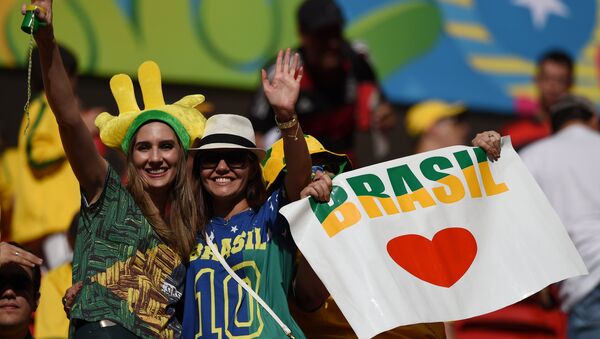World Cups are by their very nature colorful events, with football fans traveling from around the world to support their countries with singing, chanting, face-painting and national flags.
This year's tournament in Russia will be no exception but over the last 88 years — since the first World Cup in Uruguay — which fans have made a name for themselves for creating a football fiesta?
After visiting 5⃣1⃣ cities across 6⃣ continents during its global phase, the record-breaking #WorldCup @TrophyTour is heading back to Russia 🏆🌍🇷🇺
— FIFA World Cup 🏆 (@FIFAWorldCup) 30 April 2018
👉 https://t.co/yCuJOce60f pic.twitter.com/3XdHDdhKAs
Brazilians (Every World Cup)
All Latin American fans tend to be fairly colorful and this year the Panamanians are expected to make a particular splash as they qualified for their first ever World Cup, ahead of the United States.
The Mexicans, with their huge flags, sombreros and mariachi bands, are always a spectacle but the Brazilians are in a class of their own.
Occasionally the "Seleção" — the team out there on the pitch in the famous gold and blue — fail to meet their expectations but the fans always give amazing support.
Irish (1990, 1994 and 2002)
Scotland's Tartan Army famously rocked Argentina in 1978 and enjoyed their trip to Spain in 1982 but they have failed to qualify in recent years as the national team's stock has fallen.
England fans — who travel in large numbers — usually grab the headlines only for their drunken hooliganism but the Irish have managed to combine imbibing with fun rather than mayhem.
In 1994 they were especially welcomed by millions of Irish-Americans whose only other way of paying homage to their original homeland was by celebrating St Patrick's Day on March 17.
The St Patrick's Day parade in New York is famous so imagine the atmosphere in the Giants Stadium in nearby New Jersey when Ireland took on Italy.
Ray Houghton scored the only goal, sending the green army of Irish fans into rapture.
"What followed was beyond pandemonium: 37,000 Irish fans bellowed their delight while 37,000 Italian voices screamed in anguish and anger. I've never heard such a noise. I don't think such a noise has ever been made," recalled broadcaster Danny Kelly.
The Irish missed the plane to Russia after their team lost to Denmark in a play-off match last November.
But bar owners in Moscow, Saransk and Samara — who lost out on hordes of thirsty Irish fans — were cheered to hear the Danes were coming as their beer-drinking is equally legendary.
The Danes also share the Irish ability to drink without becoming aggressive.
In the mid-1980s the Danish team was the best in the nation's history.
Known as the Danish Dynamite, the team continued world-class players like Preben Elkjær, Michael Laudrup, Søren Lerby, Frank Arnesen and Morten Olsen, and Laudrup called them "Europe's answer to Brazil".
Their fans, decked out in red and white and Viking helmets, made a hell of a noise.
The Danish Dynamite under-performed in the 1986 World Cup in Mexico but six years later the same ageing team won the European Championships having famously been called back off their holidays after war-torn Yugoslavia were disqualified.
The Danes will be joined in Russia by the equally boisterous Swedes — whose endless chants of "Sverige" can be deafening — and by another debutant, Iceland, whose fans' Viking-style war chant lit up the 2016 European championships in France.
Jamaica have only ever qualified for one World Cup — in France in 1998. But their appearance was as memorable as it was short.
The Reggae Boyz, as the team was known, was sprinkled with players who were of British-Jamaican origin, such as midfielder Robbie Earle, striker Deon Burton and defender Frank Sinclair.
They lost 3-1 to Croatia but their spirits were not dampened, even after a 5-0 thrashing by the mighty Argentina in Paris a week later.
Knowing they were heading out of the competition there was only pride to play for in the final match against Japan.
The Jamaican fans roared the team on to victory with two goals from Theodore Whitmore.
South Koreans (2002)
The host fans at World Cups are usually outsung by visiting supporters but that was not the case with South Korea in 2002.
They co-hosted the tournament with Japan and while the mild-mannered Japanese succumbed in the qualifying stages, Korea marched on, supported by a huge "red army" of fans in the stadiums and watching on giant TV screens in the streets of Seoul, Busan and other major cities and towns.
On June 18, 2002 the Koreans looked to be heading to defeat against Italy — three times winner of the World Cup — but Seol Ki-hyeon seized on a defender's mistake to equalize with just two minutes to go.
Nerves jangled in the next match, when the Koreans beat Spain on penalty, but despite being willed on by a nation of 50 million people, the team fell at the final hurdle, losing 1-0 to those German killjoys in the semi-final.
But the feelgood factor remained along with a renewed sense of patriotism.
"Young Koreans, long criticized by the older generation for having no patriotism, painted their faces in the national colors and draped Korean flags over their bodies, " wrote author Daniel Tudor in his book Korea: The Impossible Country.




